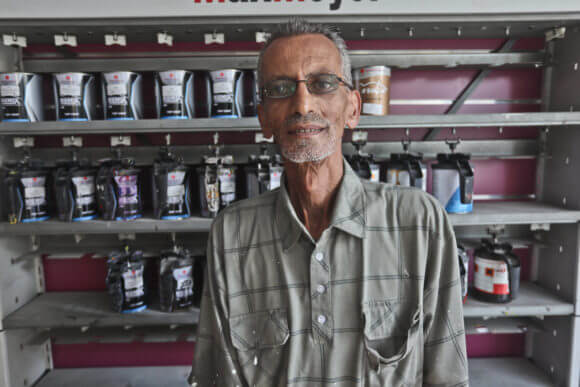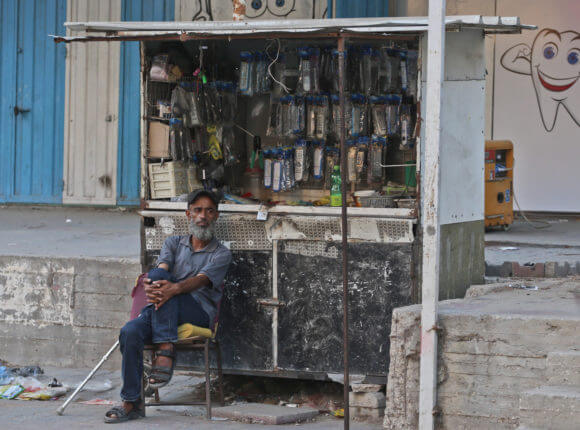Karam Marwan, 22, wanted to own a video game store. In 2016 he took out a $5,000 loan from an acquaintance to open the shop. Marwan had recently graduated college with a degree in accounting, but with limited job prospects in the Gaza Strip where he lives, he hedged his bets on starting a small business. In less than a year the video store would shutter and Marwan would be in prison serving a three-month sentence over failure to repay the borrowed seed money.
In Gaza, delinquency on loans is a civil offense punishable by a maximum of a 91-day sentence, according to the Law on Execution No. 23 passed in 2015. The statute allows judges to incarcerate a Palestinian holding a debt, irrespective if that debt is to a traditional lending institution or a private individual. In most cases, a judge will mediate a settlement between the debtors and the financers. Annually, Hamas-run endowments and loan forgiveness programs, as well as independent non-profits, will pay down or absolve some debts during the Islamic holy month of Ramadan, but many Palestinians are left to fend for themselves.
According to the European Asylum Support Office, only males have been jailed for debts in Gaza.
A spokesperson for Gaza’s police, Ayman al-Batniji, told the UK-based outlet New Arab that 93,314 Palestinians were detained over debts and overdue loans in 2018, although the spokesperson did not specify lengths of detention. This marks an increase from the nearly 80,000 who were detained in Gaza in both cases of fraud and debts in 2015, according to data provided by Gaza’s judiciary and analyzed by the New Arab.
In a report published by AFP last year, Hamas police gave numbers that present a conflicting trend, stating around 45,000 had been imprisoned for debts in 2017.
In the past decade with an increased reliance on lending institutions, more and more Palestinians are taking out loans to cover basic facets of life, or buying goods like cell phones on layaway, locally called “installments.” Islamic Relief found in a 2018 study that “92 percent of the families went into debt to secure their basic needs of food and other daily needs.”
Marwan, the video game store owner, acquired a loan that was supposed to be repaid at a rate of $200 per month. “All went well at the beginning, but in view of the electricity blackouts in Gaza, I had to arrange alternative private electricity.” The higher cost for utilities coupled with a lower demand for selling games dependent on electricity depressed his revenue.
“Seven months after the opening of the store, debt began to accumulate,” Marwan said.
Distressed, he sought money from friends and acquaintances to pay back his loan. The lender gave him two months and then filed a complaint, but during those eight weeks Marwan tried to dodge the lender.
“I began to turn off my cell-phone and got out of the house. I stopped opening my store to hide from the man who wanted his money,” he said.
“One morning, a police officer came to my house, bringing me a summons, which shocked me,” Marwarn recounted. The anxiety landed him in the hospital. “After leaving the hospital, I was arrested,” he said.
“The court sentenced me to an annual prison term of three months until I paid the remaining $4,000,” he said. He added, “my life in jail was bitter and my sister’s husband paid my debt.”
Today, Marwan’s store is closed and he is out of work, which is not uncommon in Gaza. The World Bank reported Gaza’s unemployment rate had spiked to 52 percent in 2018. At the same time the economy, in which 70 and 80 percent of revenues are from international aid and support from the West Bank-based Palestinian Authority, slumped by 8 percent.
Economic conditions have worsened over the last decade under Israeli and Egyptian blockade that began in Gaza in 2007 after Hamas came to power. While in the first few years of siege Gaza’s GDP continued to grow, infrastructure damage from three wars in ten years and most recently significant cuts in funds from the Palestinian Authority, have caused Gaza’s economy to hit a “free fall,” according to the World Bank. Palestinians who now can’t make rent are ending up in prison.


Raed al-Hawajri, 42, lives in a one-bedroom house with his wife and four children in the al-Nuseirat refugee camp in the center of the Gaza Strip. He does not have a steady job or a stable income, which makes paying rent difficult. He had odd jobs up until two years ago, working as a security guard, tilemaker, plumber, and construction worker.
His rent costs around $125 a month, which he defaulted on last April.
“I stopped working because of the bad economic situation in the Gaza Strip. I was forced out of the house by the owner, making me and my family homeless and asking for help from God and those who could help,” he said.
The owner of the house then tried to sue Raed for around $400 in overdue rent. He filed a complaint, but when Raed was not able to cover the bill he was taken to jail. After three days, a wealthy friend stepped in and paid both Raed’s back debt and upcoming bills for the next year.
Palestinians who have sought loans to cover medical bills have also ended up in prison. In Gaza, chronic illnesses impact 42 percent of households.
Mofeed Badwan, a middle-aged man with an established career as a painter contracted throat cancer in 2012. He was treated in an Israeli hospital six times over the course of six years for a combined total of four months. He spent his life’s savings, $20,000, to cover the expenses.
“I ran out of money as I had to pay all my bills and self-cover my treatment at an Israeli hospital,” he said. Earlier this year, with his cash flow gone, Badwan sought to follow up care in a hospital in Gaza. He took out a loan from two friends and his pharmacist.
“I had to borrow a total of 10,000 NIS to cover my bills and medicines and I ended up in jail for not being able to pay my debts back,” he said. He spent two days in jail and was released on an exception because of his medical condition.

-+

Moin Rajab, a retired economics professor at Al-Azhar University in the Gaza Strip, told Mondoweiss that an increasing number of Palestinians in Gaza have taken out loans in the past year. At the same time, over the last two years, public employees working for the Palestinian Authority receive only 70 percent of their salaries while thousands of others have their salaries cut down completely.
“I believe solving such disputes [mediated] through the police will not end the problem. People have to speak to societal figures to solve such problems, prison is never a good solution,” Rajab said.
Other Palestinians are winding up in debtors’ prison over loans taken out to cover wedding expenses.
Ismail Sadi, 27, took a loan to get married in 2017. Sadi intended to pay back the amount from the income he earned from working two jobs. He helped out at his father’s goldsmith workshop in a room of his parents’ house and drove a taxi. Sadi was living at home to save up money. To get married, he borrowed around $2,800 from a Gaza-based private, for-profit enterprise to pay for his wedding.
He paid back half of the loan at a rate of $100 per month. But when the owner of the taxi wanted his car back, he says, “The money was no longer enough to pay the institution and cover my household expenses. The institution complained to the police because I did not pay my monthly installment for three months in a row. The police chased me and imprisoned me.”
Sadi was sentenced to 10 days.
“My father also tried to borrow money from his friends and acquaintances to take me out of prison, but he could not secure the whole amount. He only managed to secure 1,000 NIS [$280] and paid it to the institution,” he said.
Eventually, a non-profit organization secured funds for this purpose of paying off debts of Palestinians in economic crisis. It is not a regular service, but it happens occasionally in Gaza as a form of charity.
“Some rich people,” Sadi said, “paid my debt during the holy month of Ramadan and I was able to get out of jail.”


